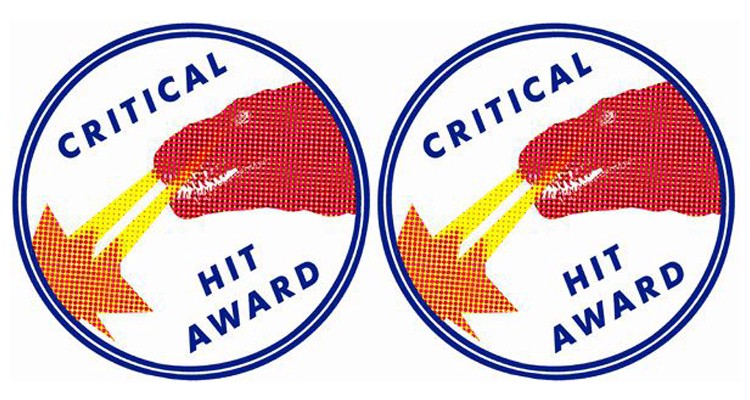Reading Lists
CRITICAL HIT AWARDS: January 2013

Welcome back to the Critical Hit Awards for book reviews. This is a round-up, a recommended reading list, and — why not? — a terribly prestigious and coveted prize. Nominate your favorite review of the month by tweeting it at @electriclit with the hashtag #criticalhit, or cast your vote in the comments section below.
Our guest judge this month is Daniel Levin Becker, reviews editor at The Believer and author of Many Subtle Channels. We asked him about optimism, Oulipian constraints, and the best time of day to read a book review.
Electric Literature: What makes a good book review?
Daniel Levin Becker: A good book review, according to the only really universal criterion I have, starts a conversation―one that ideally has as much to say as someone who’s read the book already as it does to someone who hasn’t heard of it, or for that matter who hasn’t read a book since high school. A good book review also stays rooted in the world, rather than beginning and ending within the book, though not so much so that it forgets to engage with what the author is doing.
EL: What is not a book review?
DLB: A synopsis. It’s not that synopses aren’t useful, just that nine times out of ten the chief purpose they serve is making me not want to read the book they’re synopsizing. (To be fair, this is actually a huge time-saver for me these days.) The problem with synopses is that you can’t argue against them―if all I learn from your review is that Junot Diaz’s new book is about a thinly veiled version of the author who runs around sticking his dick in anything that moves, there’s not much for me to respond to. On the other hand, if you point out something unusual about the veil or the dick or the menagerie of moving things, I already have more incentive to investigate for myself. Hence the conversation.
EL: As a member of Oulipo, do you ever think of book reviews as a kind of Oulipian constraint?
DLB: Not really. Oulipian constraints very rarely feel appropriate in criticism, even―nay, especially―in criticism of works that are themselves constrained. Like, an E-less review of an E-less book is a cute idea, but there has to be a reason for it beyond that, at which point you have to ask whether the point wouldn’t be made just as cogently without the pyrotechnics. Of course, reviewers work under constraints all the time (keep it under 600 words, don’t reveal the plot twist, try to pretend you’re not sleeping with the publicist), but to my mind the more explicit surface-level kind of constraint is the stuff of peak-obnoxiousness-era Pitchfork reviews, and I’m not trying to bring more of that into the world.
EL: You’re reviews editor at The Believer. In addition to the block of metadata that introduces each book, what makes your reviews unique?
DLB: Come to think of it, the most relevant constraint I operate under has nothing to do with the Oulipo and everything to do with The Believer’s policy of optimism: we don’t do takedowns. Put more broadly, we don’t waste page space on books that aren’t worth the reader’s time―but in theory, and occasionally in practice, that gives rise to this clever loophole whereby the review says, in effect, this awful book was worth reading because its awfulness turned out to be really rich and fascinating. I don’t know that that makes our reviews unique per se, but it’s great when it happens. Aside from that, there’s my staunch anti-timeliness policy.
EL: Where in a person’s life―time of day, form of media, mood, location―do book reviews go best?
DLB: From 4 p.m. to dusk; paper that is slightly glossy but can be folded without apprehension; languid misanthropy; a couch or comically large chair or blanket in the park where possible. Individual results may vary.
Thanks to Mark Molloy and @MikeMoats for nominating book reviews this month.
Both Flesh and Not by David Foster Wallace and The Way the World Works by Nicholson Baker
Reviewed by Ben Mauk in The Los Angeles Review of Books
This is a meandering piece, but that’s sort of the point: it’s a leisurely investigation of Wallace’s and Baker’s kindred but distinct approaches to the contents of “the brain’s overstuffed vegetable drawer,” a comparison I’ll admit never occurred to me before but absolutely rings true. It’s also a fairly fresh perspective on a topic that’s been done ad nauseam, namely considering Wallace in light of his posthumous publications (I didn’t realize until right now that two of my winners also function as larger appraisals of guys who refuse to stop releasing books despite being dead; make of that what you will).
Woes of the True Policeman by Roberto Bolaño
Reviewed by Blake Butler in Vice
Blake Butler, who is pretty much the only reason I will click on a Vice link, does an admirably careful job expressing the suspicion, which I have long shared, that Bolaño fever is/was “a sham around a mediocre foreign writer who died young and was being fetishized by profile-worshipping Americans who thought he had done something new when really he was just another boring narrative writer.” The real payoff of this review, though, is that he doesn’t read Woes and confirm or disabuse himself of that suspicion: he just challenges it earnestly and decides to keep it but make room for it in the rational order of things anyway.
Martin Amis by Richard Bradford
Reviewed by Dwight Garner in The New York Times
Speaking of Martin Amis, one of the first and best book reviews I ever midwifed was Nick Antosca’s piece in the Yale Herald about Natalie Krinsky’s Chloe Does Yale: Krinsky’s novel is not substantial enough, he says, to merit Amis’s memorable condemnation “a necropolis of prose”―but only because it is “too meager, too infernally moronic, for a grand denunciation. One could more accurately think of the book as a sort of Hooverville for sentences, populated by the barely subsistent, the ill-clothed and shivering, the grateful to be alive.” Which is a digressive way of hat-tipping Garner for describing Bradford’s biography as filled with sentences “in which words come together as if to commit ritual mass suicide.” (Thanks to Michael Moats for the nomination.)
Read a good review lately? Nominate it for a Critical Hit Award by tweeting it at @electriclit with the hashtag #criticalhit or cast your vote in the comments section below.
***
— Daniel Levin Becker’s first book, Many Subtle Channels: In Praise of Potential Literature, was published by Harvard University Press in April.
— Brian Hurley, curator of Electric Literature’s monthly Critical Hits Awards, is over here.









